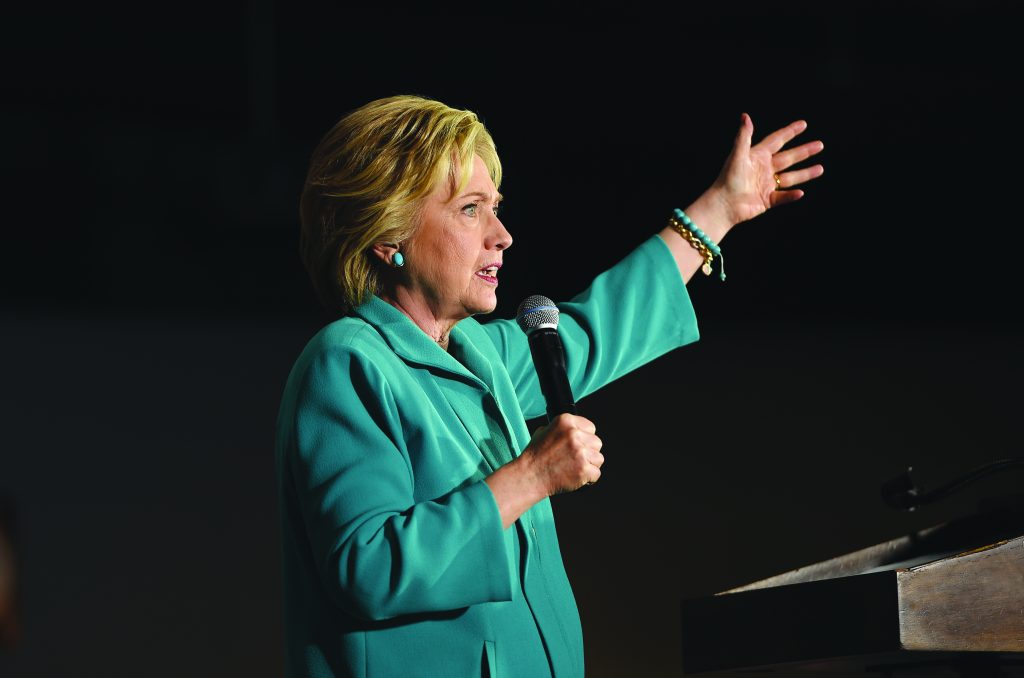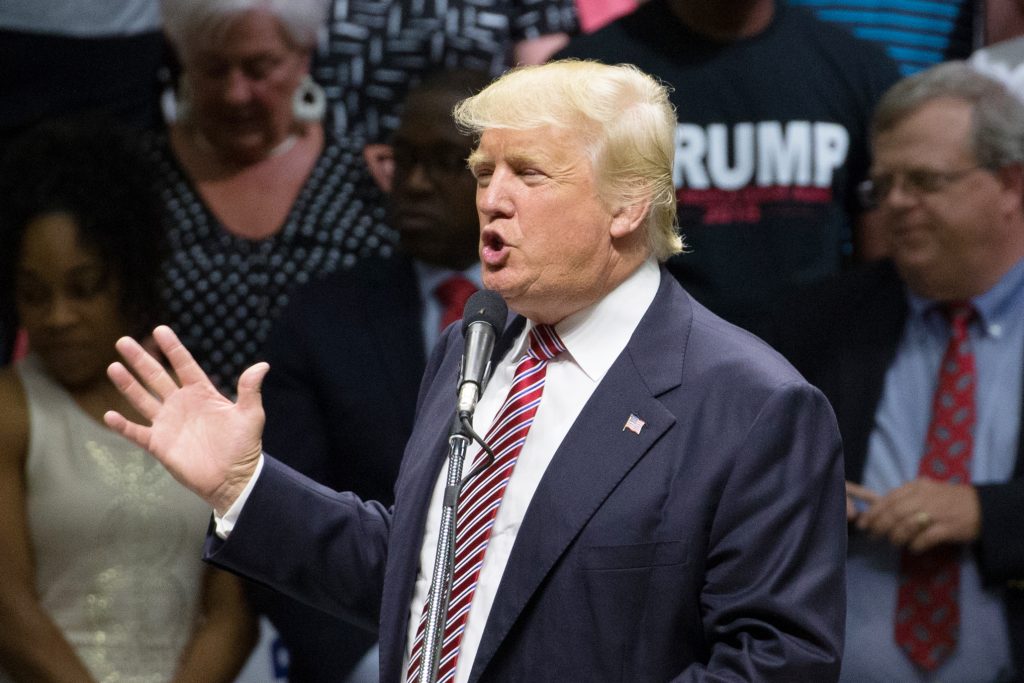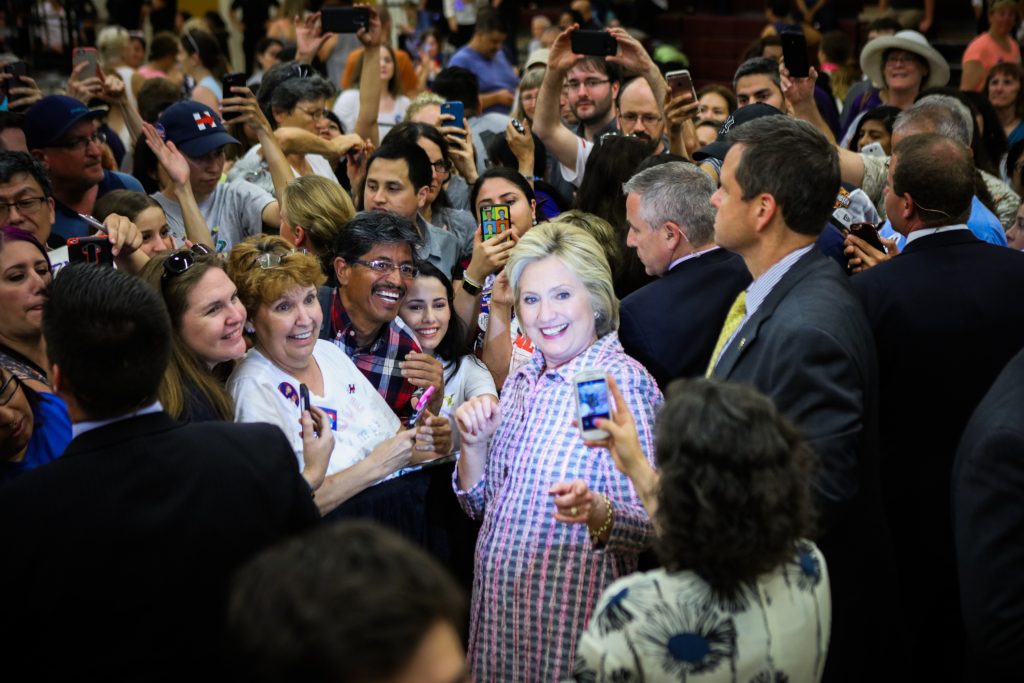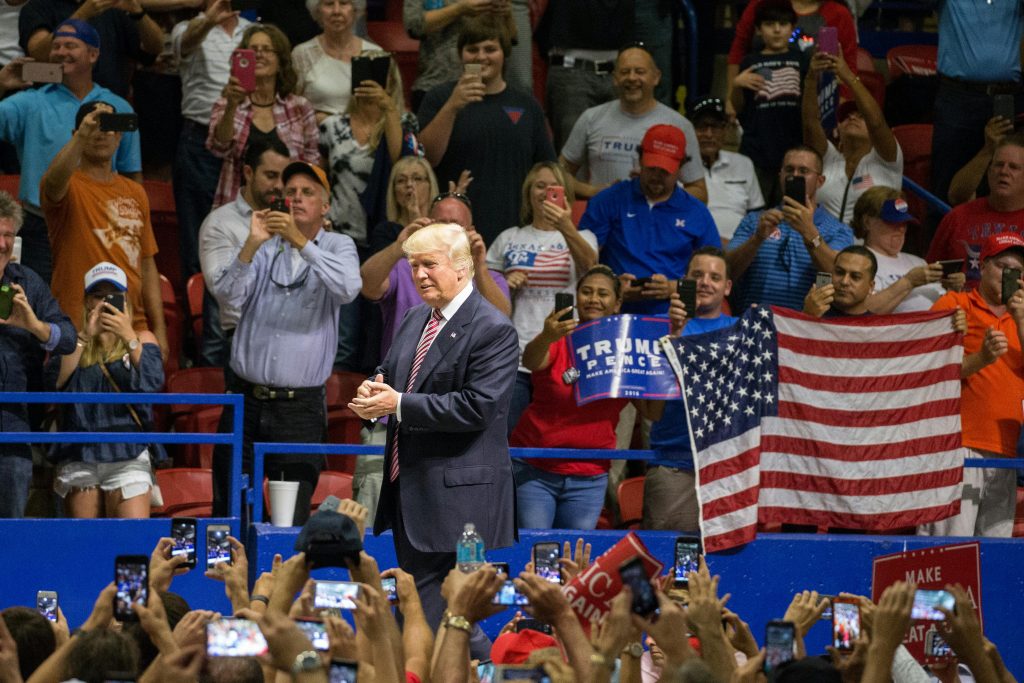The Devil and the Deep Blue Sea: US Elections
By Mahir Ali | Newsbeat International | Published 8 years ago
There are just a few weeks to go: by November 9, barring the kind of fiasco that marred the 2000 US presidential election, the identity of Barack Obama’s successor will have been determined beyond reasonable doubt. The weight of probability is tilted towards Hillary Clinton at the time of writing. But if it would be utter folly for American voters to lean the other way, it would equally be folly to completely write off Donald Trump.
The opinion polls have lately been see-sawing, sometimes putting the two leading contenders almost on a par, give or take the margin of error. Both candidates stand out on account of their unpopularity: never before, according to those who keep records of such matters, have the nominees of the Democratic and Republican parties been lumped with the level of negative ratings Clinton and Trump face.
At a basic level, Clinton broadly represents continuity (which young Americans in particular are inclined to disdain), while Trump represents change — but, in the eyes of many, change for the worse. And while the former’s record as first lady, secretary of state and senator may be questionable in various respects, she is a known quantity. Her potential actions and attitudes as president, both at the domestic level and on the international stage, are unlikely to surprise anyone. Her rival, on the other hand, is completely unpredictable.
During the fraught contest for the Republican presidential nomination, Trump declared he would seek a moratorium on any Muslims entering the US, whether as immigrants or visitors. He said he would insist on Mexico paying for a wall along its border with the US. He insulted women, Latinos and African Americans. He has persisted with most such themes, including plans to “secure” Pakistan’s nuclear weapons and to grab Iraqi oil as compensation for the trillions of dollars America ‘spent’ on invading (and destroying) that country.
He is inconsistent in other respects, though. He initially boasted of having, unlike US generals, a plan to rout Islamic State (IS) within months, but has subsequently taken to saying that, upon his inauguration, he will give those very generals a brief chance to come up with a strategy for getting that result. He has claimed to oppose US military interventions abroad (and has frequently lied about his alleged antipathy towards the American roles in Iraq and Libya), yet has declared his intent to vastly expand his nation’s armed forces at the expense of cuts in non-defence-related state expenditure. What exactly would that be for, if the idea is to cut down on foreign interventions?
Trump is also attracted to strongmen — his admiration for the likes of Vladimir Putin and Narendra Modi may well stretch to seeing them as role models (although it’s perfectly conceivable that in power he would most closely resemble the trigger-happy president of the Philippines, Rodrigo Duterte). His uninhibited Islamophobia has, perhaps inevitably, won him the devotion of some of the more far-out forces of Hindutva, and Trump has spoken in vague terms of teaming up with India to keep Pakistan under control. Pakistan, he has claimed, “could go rogue” (it would presumably be news to him that Pakistan in fact went rogue in the early 1980s, with American encouragement and support). “India is the check to Pakistan, “ he noted several months ago. “they have their own nukes and their own army and I would start talking at that level very, very quickly.” He would be inclined, in other words, to persuade India to go rogue, too. That would not augur well under any circumstances, but it’s an especially dangerous tendency given the heightened tensions between the South Asian neighbours.
There are plenty of signs that a Trump presidency would be an unmitigated disaster for the US both at home and internationally, no doubt compounded by the ridicule to which he has been subjected by domestic critics as well as government representatives from Europe to Latin America. Meanwhile, just as he enjoys the support of the Ku Klux Klan and other right-wing extremists at home, his fascist inclinations, especially on immigration, have also been hailed by neo-Nazi parties in Europe.
Clinton, meanwhile, has won the endorsement of a host of neoconservative figures associated with the disastrous foreign policy of the George W. Bush administration – and the Bush family itself has indicated it prefers her to Trump, as have key segments of the Republican establishment. More bullish elements among the left see that as a red rag, and it confirms them in their longstanding discomfort with Clinton and all that she represents, from her hawkishness in the international sphere to her attachment to Wall Street.
When the self-proclaimed democratic socialist Bernie Sanders threatened her to an unexpected degree in primaries and caucuses, Clinton was at pains to paint herself as a progressive. She went about it clumsily and apparently without much conviction, but eventually switched her stance to oppose international trade deals that unequivocally and inexorably privilege corporations over their employees, and to favour tuition-free college education. Whether these and other concessions to the left are anything more than tactical shifts intended to draw Sanders supporters, and will be dispensed with once she is safely ensconced in the White House, remains to be seen. The suspicion that the second President Clinton will re-emerge as Goldman Sachs’ biggest fan is well-grounded.
As first lady, Clinton was at the helm of an ill-fated attempt to reform healthcare. Obama proved more successful with his version, even though he allowed profit-oriented insurance firms to craft its details, and although health cover was extended to hundreds of thousands who did not have it before, it stopped well short of the universal coverage that is the norm in most other western democracies. Sanders was determined to go the whole hog; Clinton is highly unlikely to travel in that direction.
On the domestic front, though, drastic departures from the Obama administration’s policies are unlikely. On the other hand, a considerably more gung-ho approach to foreign policy would not be particularly surprising. Obama has commonly been characterised as weak on the international front, notably for refusing to plunge into Syria with a full-fledged invasion. The Syrian situation is undoubtedly abysmal at every level but, given the consequences of invading Iraq and intervening in Libya, what are the chances that American boots on the ground would have helped to stem, or at least reduce, the bloodshed? The eventual outcome may well have involved leaving whatever remained of the country to Islamists of one shade or the other.
Clinton, as secretary of state, was considerably more enthusiastic than her president about falling in with the British-French plan to deploy Nato forces in Libya (a British parliamentary committee last month strongly criticised the Cameron administration’s ill-motivated and stupidly conducted military campaign). There can be little doubt that, had she become president in 2008 instead of Obama, there would today be far larger numbers of US military personnel in Syria, with the wretched country conceivably even worse off than it is today.
The Middle Eastern powers that have been particularly incensed by Obama’s tendency to ask questions before opening fire are Israel and Saudi Arabia alongside its smaller Gulf allies. The Saudis and Israelis are more or less on the same page these days, which is hardly illogical. At the same time, neither country has ever profited as much from American largesse as it has done under Obama’s auspices — and the US has more or less uncritically backed the richest Arab nation in its war against the poorest, Yemen, which has been at the receiving end of repeated war crimes and a humanitarian crisis that parallels the one in Syria, but is only sporadically documented.
One shouldn’t be surprised if there turn out to be elements of racism in Tel Aviv and Riyadh’s hostility to Obama. Both would probably prefer Clinton to Trump as the next president: she has no quarrel with the increasingly rabid Likud party that runs Israel, and Saudi wealth isn’t likely to lose its allure for her anytime soon.
The role of moneyed interests isn’t exclusively a Trump phenomenon, though. The Clinton Foundation, which accepts donations from all manner of foreign and domestic sources, has also come under scrutiny, and the suspicion that Hillary Clinton is susceptible to million-dollar influences will linger, reinforced by her dogged refusal to release the contents of lucrative lectures hosted by Goldman Sachs.
There is, meanwhile, at least one respect in which Clinton may well prove to be a considerably more dangerous occupant of the White House than her opponent. Tensions have been rising on the periphery of the former Soviet Union, with sporadic provocations from Nato as well as Russia, notably in the Balkans. It has been suggested that the old adversaries, whose efforts towards coordinated military efforts in Syria keep collapsing amid mutual recriminations, could be sleepwalking into a conflict of potentially catastrophic dimensions. Clinton’s gung-ho instincts are more likely to trigger an escalation than facilitate some kind of conciliation. Trump is hardly known for keeping a cool head, but it is possible to imagine a scenario in which his much-mocked, long-distance bromance with Putin could possibly come in handy.
On the other hand, heightened tensions with China would likely prove considerably harder to peacefully resolve with Trump in charge.
Pakistan has historically felt more comfortable with Republican administrations, often for all the wrong reasons, particularly during our prolonged phases of military rule. It’s hard to imagine anyone looking forward to a Trump presidency, though, notwithstanding the likelihood that a Clinton administration may well place more demands on a “duplicitous ally” in the context of the Taliban and Afghanistan.
It must be hoped that most American voters will, broadly speaking, see it the same way on November 8. There would be little point in entertaining any illusions about Hillary Clinton. In a nation yearning for various kinds of change, she essentially represents the status quo. Donald Trump, on the other hand, undoubtedly embodies change. But on almost every front, from immigration and race relations to steadily deepening disparities of wealth, his blinkered vision could produce untold damage. Sadly for American democracy, it boils down to a choice between bearing the ills they have and flying to others they know not of.
Mahir Ali is an Australia-based journalist. He writes regularly for several Pakistani publications, including Newsline.






